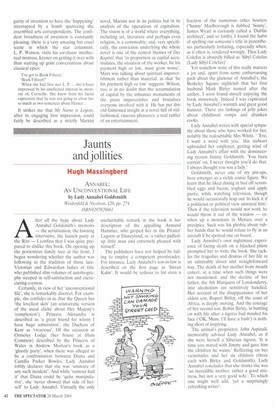Jaunts and jollities
Hugh Massingberd
ANNABEL: AN UNCONVENTIONAL LIFE by Lady Annabel Goldsmith Weidenfeld & Nicolson, £20, pp. 274, I5BN0297829661 After all the hype about Lady Annabel Goldsmith's memoirs — the serialisation, the fawning interviews, the launch party at the Ritz — I confess that I was quite prepared to dislike this book. On opening up the portentous family tree at the front, I began wondering whether the author was following in the tradition of those lateVictorian and Edwardian ladies of title who published slim volumes of autobiography steeped in self-satisfaction and excruciating coyness.
Certainly, in view of her 'unconventional life', she is remarkably discreet. For example, she confides in us that the Queen has 'the loveliest skin' (an aristocratic version of the usual cliché about Her Majesty's `complexion'). Princess Alexandra is described as 'a great friend for whom I have huge admiration', the Duchess of Kent as 'vivacious'. Of the occasion at Ormeley Lodge (her house at Ham Common) described by the Princess of Wales in Andrew Morton's book as a 'ghastly party', when there was alleged to be a confrontation between Diana and Camilla Parker Bowles, Lady Annabel loftily declares that she was 'unaware of any such incident'. And while 'rumour had it' that Diana could be 'quite manipulative', she 'never showed that side of herself to Lady Annabel. Virtually the only uncharitable remark in the book is her description of the appalling Armand Hammer, who groped her in the Pirates' Lagoon at Disneyland, as 'a rather puffedup little man and extremely pleased with himself.
The publishers have not helped by failing to employ a competent proofreader. For instance, Lady Annabel's son-in-law is described on the first page as 'Imran Kahn'. It would be tedious to list even a fraction of the numerous other howlers (`Sunny' Marlborough is dubbed 'Sonny', James Wyatt is curiously called a 'Dublin architect', and so forth). I found the habit of spelling out someone's title in parentheses particularly irritating, especially when, as it often is, rendered wrongly. Thus Lady Colefax is absurdly billed as 'Sibyl Colefax (Lady Sibyl Colefax)'.
Yet somehow none of this really matters a jot and, apart from some embarrassing gush about the glamour of Annabel's, the Berkeley Square nightclub that her first husband Mark Birley named after the author, I soon found myself enjoying the book immensely. Indeed I was captivated by Lady Annabel's warmth and great good humour. There are lashings of jolly jokes about childhood romps and drunken cooks.
Lady Annabel writes with special sympathy about those who have worked for her, notably the redoubtable Mrs White. "Ere, I want a word with you,' this stalwart upbraided her employer, getting wind of Lady Annabel's affair with the domineering tycoon Jimmy Goldsmith. You been carryin' on. I never thought you'd do that. I always thought you was a lady.'
Goldsmith, never one of my pin-ups, here emerges as a richly comic figure. We learn that he liked dining in bed off scrambled eggs and bacon, yoghurt and apple purée, while watching television, though he would occasionally leap out 'to kick it if a politician or political view annoyed him'. Then if the television would not work he would throw it out of the window — or, when up a mountain in Mexico, over a precipice. Such was his phobia about rubber bands that he would refuse to fly in an aircraft if he spotted one on board.
Lady Annabel's own nightmare experience of facing death on a hijacked plane prompted her to write the book. She tackles the tragedies and dramas of her life in an admirably direct and straightforward way. The death of her mother from mouth cancer, at a time when such things were not mentioned, and the decline of her father, the 8th Marquess of Londonderry, into alcoholism are sensitively handled. Her account of the disappearance of her eldest son, Rupert Birley, off the coast of Africa, is deeply moving. And the courage of her second son, Robin Birley, in battling on with life after a tigress had mauled his
face ('OK, Mum, have a bash') is nothing short of inspiring.
The animal's proprietor, John Aspinall, memorably advised Lady Annabel, as if she were herself a Siberian tigress, 'It is time you mated with Jimmy and gave him the children he wants.' Reflecting on her vicissitudes and her six children (three each with Birley and Goldsmith), Lady Annabel concludes that she thinks she was 'an incredible mother, rather a good mistress, but not a very good wife'. To which one might well add, 'yet a surprisingly refreshing writer'.


















































































 Previous page
Previous page